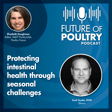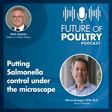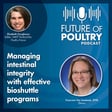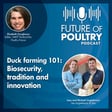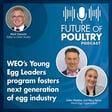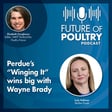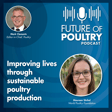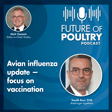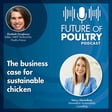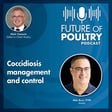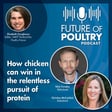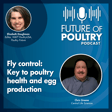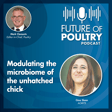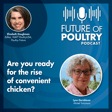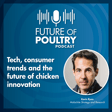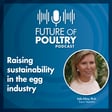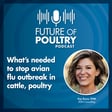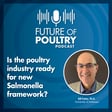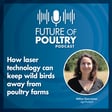Become a Creator today!Start creating today - Share your story with the world!
Start for free
00:00:00
00:00:01

Rearing insects for human consumption: Lessons for the poultry industry
Mark Clements, editor in chief, poultry, with WATT Global Media, is joined by Nils Grabowski, DVM, head of insect hygiene and technology the University of Veterinary Medicine Hannover, to look at the myths surrounding human consumption of insects and what developments in the area might teach the poultry industry.
Transcript
Introduction to Edible Insects
00:00:00
Speaker
Hello, and welcome to the Future of Poultry podcast series.
00:00:12
Speaker
Hello, I'm Mark Clements, Editor-in-Chief Poultry with What Global Media. Today, we're not going to talk about poultry. Rather, we're going to look at another source of protein, edible insects for human consumption.
00:00:25
Speaker
Why would we be talking about what could be viewed as a competitor to the world's favorite meat? Well, insects for human consumption in reality are unlikely to ever compete with poultry meat.
00:00:36
Speaker
But the evolution of the industry could hold some insight for poultry producers.
Myths and Cultural Perceptions
00:00:41
Speaker
Late last year, i was fortunate to attend a presentation given by Dr. Niels Rabowski of the University of Veterinary Medicine, Hanover, Germany,
00:00:50
Speaker
on the myths surrounding human consumption of insects. And I'm delighted that Niels can join us today. Niels, welcome. Thank you for agreeing to join the podcast today. Well, hello, Marc. Thanks a lot for inviting me.
00:01:03
Speaker
I'm very happy and i'm very honoured. We're delighted to have you here, Niels. Now, before we look in detail at insect consumption, Niels, could you p perhaps tell us how your interest in the sector came about?
00:01:16
Speaker
Well, in fact, I studied my career in veterinary medicine in Mexico. There was one talk about edible insects that rose my interest. And in this talk, there was quite a big focus on the indigenous roots of entomophagy, that means the consumption of insects.
00:01:32
Speaker
In fact, in Mexico, it's one of those privileged countries But there's about 300 different species of edible insects known from the days of Otacuxoma on. And it is one thing. And the other thing is that there has been lot of research done by a local doctor, which was Julieta Ramos y Lourduy.
00:01:51
Speaker
And so she would do very careful work on seeing what insects have been mentioned literature, which are consumed. What about additional things and all this stuff. And that made a quite stable solid base for, well, for my idea.
00:02:05
Speaker
And then afterwards, when I returned to Germany. Then I just came across a small package of dried caterpillars from Mr. Ghana, and I had a chance to work with those samples in terms of microbiology and also on chemical composition.
00:02:19
Speaker
And this is where everything started. If we were to compare human consumption of insects with, let's say, poultry-consuming insects, is the latter not more natural? What I want to say is birds in the wild, happily insects. But this is not generally the case where humans are concerned. And this Is the widespread belief that insects should only be eaten when there's a lack of a better alternative? Something to eat out of desperation, perhaps?
00:02:48
Speaker
In fact, this is a question of tradition and where you actually coming from. There are countries in which eating insects nowadays is something exotic or repulsive. However, there are many, many countries in the world which actually have a long tradition of consuming insects.
00:03:07
Speaker
In fact, there are some 2.8 billion people consuming insects in a regular base, but typically not in Europe, not in the US, not in Australia. That means in all those areas where we have a very strong influence by Western civilization, these are the areas which actually do not practice this kind of consumption at a larger state. so There are hot spots. Of course, I mentioned Mexico is one of them, but there are also areas, let's say, the northern part of South America, the sub-Saharan Africa. There are also many areas in southern Asia, from India over to Myanmar, to Thailand, to Cambodia, down to Indonesia.
Overcoming Disgust: Taste and Safety
00:03:47
Speaker
But also there is, for instance, a very strong tradition of consuming insects Australia by means of the Aboriginal people.
00:03:54
Speaker
So there are actually, let's say, many people that have a strong tradition in this point. That means, of course, the typical insect to be consumed are those which are available at a large amount, which would be good to harvest because there are so many of them.
00:04:10
Speaker
Or there are some which are highly exclusive. And so consumption also makes it exclusive. So this is one thing. And actually, insects have been a very strong alternative whenever those species which we consider domestic vertebrates, such for instance as pigs or cows, are not really available or actually do not prosper in a certain area.
00:04:32
Speaker
And of course, there is this old saying, as we have it in Spanish, si te silo te caen limones, aprende a hacer limonada. means if lemons fall from the tree, then learn to make lemonade of them. That means you have to make sure that you can make use of resources.
00:04:49
Speaker
Well, yes, I accept that there's an established culture in in some parts of the world for eating insects, but I'm afraid to say, isn't it a bit disgusting for some of us in some cultures?
00:05:03
Speaker
Well, once again, it's tradition. We are accustomed to what actually we traditionally eat. hu Of course, disgust is an important item.
00:05:14
Speaker
Disgust was made to prevent us from getting intoxicated. means there are certain items that provoke disgust in us psychologically. However, those stimuli which actually provoke disgust in a given individual may vary strongly.
00:05:32
Speaker
And they are also culturally mediated. For instance, here in Germany, we are very, very fond of consuming raw minced pork meat. Typically, we have it on bread with some raw onions, with some salt and some pepper.
00:05:48
Speaker
And just go out in the world and ask, who does this apart from the Germans? So there are many, many things which some people consume and others actually, well, think it's disgusting.
00:06:01
Speaker
If you go, for instance, to Sweden, you have the Seoströmming, which is something like a fermented herring, which is sold canned. But the smell is so strong that, in fact, even in Sweden, it's not allowed to open those cans inside ah room.
00:06:16
Speaker
So you have to go out. ah And so if you look, there are many of those examples of things that certain people consume. And many counterexamples say, that well, this is just completely disgusting.
00:06:27
Speaker
hu So disgust is important, yet the stimuli which trigger it, they vary and they may be also change and overcome.
00:06:38
Speaker
So in fact, I think consuming insects is something which can be learned and typically learned by giving the try and having really nice taste event because many people think that insects just taste as horrible as they look.
00:06:56
Speaker
But if you have it properly prepared and you have a large array array of recipes all over the world to make them spicy and lovely, then people link the sensorial experience with the optic thing and say, okay, although it looks quite unusual, say it in a nice way, it still tastes good.
00:07:15
Speaker
I think you've convinced me that we may need to open our minds where disgust is concerned. But are insects safe for human consumption and are they really that nutritious?
00:07:26
Speaker
Well, let us see. In those parts of the world where we have this millennial tradition of entomophagy, it wouldn't be a tradition if it wouldn't not be safe.
00:07:37
Speaker
It means that by millennia of trial and error, people have found out what can be consumed safely in which way. ah So it is good to hear what our forebears well found out ah in time to see which, let's say, pitfalls must be avoided.
00:07:57
Speaker
yeah For instance, heating is one of those steps. Typically, insects are consumed after any kind of heating procedure, roasting, cooking, boiling, deep frying, whatever you have there.
00:08:08
Speaker
because this does not only actually reduce bacterial load as also it would be with more traditional foodstuffs but also actually inhibits any kind of other unpleasantries just to give an example there is a big large habit of consuming certain moth caterpillars in western africa and tradition has shown that these are typically consumed after heating.
00:08:36
Speaker
And of course, there is never missing one of those smart guys as well. Why do I have to eat them? I just eat them raw. And these guys turned out to have some problems with their nerves afterwards because it was found out that these caterpillars in the raw form contain an enzyme which actually splits up certain vitamins.
00:08:57
Speaker
But if you do as the forebears do and heat the things, then this enzyme isn't activated and there is no problem at all. That means we have a very strong and quite efficient system from tradition on how to use insects properly. Then, of course, we have modern food safety concepts, which actually also includes typically not only the eating, but also the analysis steps in order to see if those measures are actually effective or not.
00:09:27
Speaker
So this is also is the case. And you see, at at least in Europe, when insect products are placed on the market, there must have been a very strong assessment of any kind of risks. ah And so at least from the European ah legislation, these foodstuffs are definitely
Nutritional Value of Insects
00:09:45
Speaker
safe.
00:09:45
Speaker
So in terms of nutritious, I know that people think, well, typically insects are so full of protein. And this is something which I have to, let us say, correct in a certain way.
00:09:56
Speaker
First of all, Insects do not only contain protein, they also contain minerals, they contain fats, they contain vitamins, they contain all other kinds of nutrients.
00:10:07
Speaker
Now, the second thing I have to stress is that that this chemical composition varies greatly, not only between or not only among species, but also depending on what they ate before and also how they are processed.
00:10:25
Speaker
Hmm. If you look for instance, add protein, the most people want typically what you have as the locusts and the grasshoppers, they really have a very, a very high level of protein.
00:10:36
Speaker
hu about 70 80% in the dry matter. However, if for instance, if you look at termites, their values drop to 50%. We won't typically have some 60% of this varies in the first point.
00:10:50
Speaker
Then of course, we have seen that depending on what what you feed them, also these values may change. We have seen that, for instance, in case of like soldier flies, okay, they're not for consumption, but anyway, the protein content may vary up to 10%, depending on what they consume before.
00:11:08
Speaker
And of course, to this case, here processing is also because if you only dry the insects, everything or the solid parts remains inside the animals. But if you boil them, then in fact, the same thing happens with boiling meat or if you lose some protein, you lose some fat into the water, forming a broth.
00:11:28
Speaker
So basically it is safe if we play by the rules and the composition and also the taste, which also is important, very strongly.
00:11:39
Speaker
ah The taste is typically varying according to species. This is nothing new because also we can tell but well by the mere taste if we are consuming, let's say, chicken, or turkey or ducks, for instance.
00:11:54
Speaker
It would sound then, Niels, that if insect protein is produced cheaply enough, it could replace chicken or or other sources of animal protein? Currently, I think insects are not really a replacement, but rather an enrichment to our existing diet.
00:12:11
Speaker
Because, as you mentioned, there are still many people beyond the tradition who have troubles consuming insects. This is the first thing. And also one and another important thing, at least in the sector of, let's just insect for human consumption is the price.
00:12:27
Speaker
And this is something which also must be addressed properly. This is because currently many, many insects are quite expensive at the moment. At least here in Europe. Of course, this was is different in other countries, but if we in Europe want to produce insects for a better price, and this is one of the important factors of buying them. Then we have to try to make the production cheap, typically in terms of energy management, for instance, and trying to make automatizations whenever possible. I do not think it is really replacement. It is motherless, something which is additional.
00:13:01
Speaker
Moreover, because insects do taste well, but when they have it in an original style, they don't really taste like meat.
Environmental and Regulatory Considerations
00:13:09
Speaker
If we turn to biosecurity, in the case of the the black soldier fly, for example, which is used in animal feed, we have companies that are working on making them more robust. And could not that, combined with climate change, run the risk, should there be an escape into the wild, whether race for human animal consumption, could that not be a problem?
00:13:30
Speaker
Well, basically, of course, but this is nothing new. In fact, we have seen it with rabbits and dromedaries in Australia who have introduced And they actually a serious problem. So specifically in case of the black soldier fly, as far as my knowledge goes, it is already in Europe anyway.
00:13:46
Speaker
So escaping animals would in fact be nothing new to the entire system. But I share your point. There are species which should not enter other parts of the world where they're not native to, because some of the edible insects are actually working as pests, for instance, locusts, but also the palm weaver larvae. However, climate change, as you mentioned it, is already on the move.
00:14:09
Speaker
And we should be prepared to address those issues because I do not think that whether these animals pose a problem escaping from farms, but rather coming directly and unintentionally to our countries.
00:14:21
Speaker
It takes me on to the point of regulation. Do producers have the regulatory framework that they need to grow? Do they need more? Do they need less? so Or is it the case that what we need is greater clarity around insect production?
00:14:35
Speaker
Oh, good question. I think this will also mainly depend on the country because in fact legislation for productive insects very strongly among countries. There are some which not even mention insects and some who are actually having, let's say, a series of, let's say, local or national regulations pertaining insects. So this would be, as I say, down to a specific area in order to have a proper answer for that.
00:15:00
Speaker
I've seen insects for sale in a few supermarkets, including in Europe, but they remain a niche. Whereas as far as production for feed is concerned, the industry seems to be much more advanced.
00:15:12
Speaker
And even if human perceptions change, would insect production for humans attract the capital to grow and thrive when the feed sector may be much more attractive?
00:15:24
Speaker
Good question. Once again, it will depend on the area.
Market Potential and Challenges
00:15:27
Speaker
yeah If you have areas and where you have a strong tradition of consuming insects, like for instance, Thailand or Cambodia, I think it would be much easier to set up, let's say, stronger commercial production of edible insects than, for instance, areas and where insects would have not played such a large role, like for instance, Italy or let's say the US, for instance, or even Germany. We have seen, at least here in Germany, that people are definitely fine with animals feeding insects and then consuming the animals, but still a larger problem to have people eat eat insects directly because they are still so much associated with dirt, disgust and death, to say it that way.
00:16:06
Speaker
Niels, thank you for sharing all of your insight with us today. Before we finish, are there any final thoughts that you'd like to leave our listeners with? Well, possibly with a little quote, don't panic.
00:16:21
Speaker
ah Typically, because I think a lot of suspicion comes from lack of knowledge. And since we are, let's just say, cautious in this point of view, I would invite everybody to get more in touch into this subject and to see that consuming insects is nothing from out of this world. And that, let's just say, 2.8 billion people haven't died from them.
00:16:42
Speaker
So possibly a little bit more confidence should be in place. Thank you. Niels, thank you once again for joining us today and helping us to overturn the myths surrounding insect consumption.
00:16:54
Speaker
Listeners, thank you to you for listening. Don't forget to look out for future editions of the Future of Poultry podcast. Until next time, goodbye.
